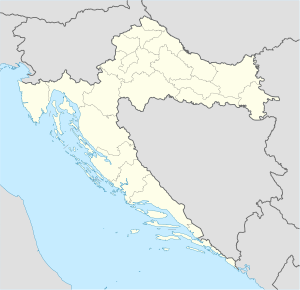The Hrvatski nogometni kup, also colloquially known as Rabuzinovo sunce, is an annually held football tournament for Croatian football clubs and is the second most important competition in Croatian football after the HNL championship. It is governed by the Croatian Football Federation (HNS) and usually runs from late August to late May. Cup winners automatically qualify for next season's UEFA Europa Conference League, except when cup winners are also Prva HNL champions, in which case their berth in the Europa Conference League goes to the best placed team in the Prva HNL who haven't qualified for the UEFA competitions through their league performance.
The 1992–93 Croatian First Football League was the second season of the top football league in Croatia since its establishment after Croatia gained independence from Yugoslavia. Games were played from 23 August 1992 to 12 June 1993.
The 2007–08 Croatian First Football League was the seventeenth season of the Croatian First Football League, the national championship for men's association football teams in Croatia, since its establishment in 1992. The season started on 20 July 2007 and ended on 10 May 2008. Dinamo Zagreb were the defending champions, having won their eleventh championship title the previous season, and they defended the title again, after a win against Međimurje on 12 April 2008.
The 2002–03 Croatian First Football League was the twelfth season of the Croatian First Football League, the national championship for men's association football teams in Croatia, since its establishment in 1992. The season started on 24 July 2002 and ended on 31 May 2003. NK Zagreb were the defending champions, having won their first championship title the previous season. Dinamo Zagreb won the title, after a win against Varteks on 17 May 2003.
The 2003–04 Croatian First Football League was the thirteenth season of the Croatian First Football League, the national championship for men's association football teams in Croatia, since its establishment in 1992. The season started on 24 July 2003 and ended on 15 May 2004. Dinamo Zagreb were the defending champions, having won their tenth championship title the previous season. Hajduk Split won the title, after a win against Varteks on 15 May 2004.
The Croatian Academy Football League is the top level of youth football in Croatia. It is contested by academy teams of First League clubs and is organised by the Croatian Football Federation.
The 2008–09 season was the 98th season in Hajduk Split's history and their eighteenth in the Prva HNL. Their 5th-place finish in the 2007–08 season meant it was their 18th successive season playing in the Prva HNL.
This article shows statistics of individual players for the football club Dinamo Zagreb. It also lists all matches that Dinamo Zagreb played in the 2006–07 season.
The 2009–10 season was the 99th season in Hajduk Split’s history and their nineteenth in the Prva HNL. Their 2nd place finish in the 2008–09 season meant it was their 19th successive season playing in the Prva HNL.
The 2010–11 Croatian First Football League was the 20th season of the Croatian First Football League, the national championship for men's association football teams in Croatia, since its establishment in 1992. It began on 23 July 2010 and ended on 21 May 2011. Dinamo Zagreb were the defending champions, having won their 12th championship title the previous season, and they defended the title again.
The 2010–11 Croatian Football Cup was the twentieth season of Croatia's football knockout competition.
The 2011–12 season was the 101st season in Hajduk Split’s history and their twenty-first in the Croatian First Football League. Their 2nd place finish in the 2010–11 season means it was their 21st successive season playing in the Prva HNL.
The 2012–13 season was the 102nd season in Hajduk Split's history and their twenty-second in the Prva HNL. Their 2nd-place finish in the 2011–12 season means it was their 22nd successive season playing in the Prva HNL.
This article shows statistics of individual players for the Cibalia football club. It also lists all matches that Cibalia played in the 2012–13 season.
The 2004–05 season was the 94th season in Hajduk Split’s history and their fourteenth in the Prva HNL. Their 1st place finish in the 2003–04 season meant it was their 14th successive season playing in the Prva HNL.
The 2003–04 season was the 93rd season in Hajduk Split’s history and their 13th in the Prva HNL. Their second place finish in the 2002–03 season meant it was their 13th successive season playing in the Prva HNL.
The 2006–07 season was the 96th season in Hajduk Split’s history and their sixteenth in the Prva HNL. Their 5th place finish in the 2005–06 season meant it was their 16th successive season playing in the Prva HNL.
The 2007–08 season was the 97th season in Hajduk Split’s history and their seventeenth in the Prva HNL. Their 2nd place finish in the 2006–07 season meant it was their 17th successive season playing in the Prva HNL.
This page details football records in Croatia. It counts only results and records from 1992 onwards, as that year marked both Croatia's re-admittance into FIFA and start of Croatian First Football League. Prior 1992 Croatian clubs were part of Football Association of Yugoslavia. Croatia declared independence from Yugoslavia in 1991. In 1993 Croatia was admitted into UEFA.
The 2016–17 season was the 71st season in HNK Rijeka’s history. It was their 26th successive season in the Croatian First Football League, and 43rd successive top tier season.
